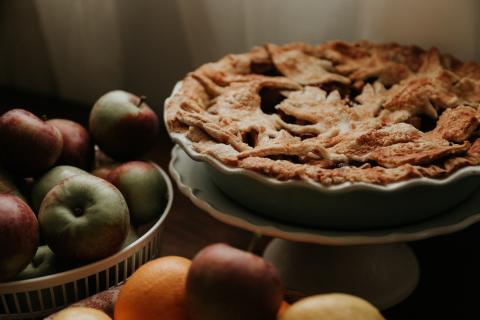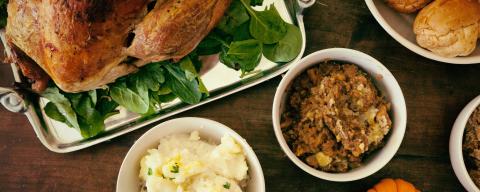Thanksgiving Food Safety Basics
However you celebrate, Thanksgiving is a time for welcoming friends, family, guests, visitors and others into your home for a meal. Whether your hosting philosophy is of the “more-the-merrier” bent or you prefer small, intimate gatherings, you want your guests to feel welcome and be safe.
There is one group you will want to keep far away from your Thanksgiving celebrations: the viruses and bacteria that cause foodborne illnesses. These unwanted guests often appear via flu-like symptoms within 24 to 48 hours after the big meal. Did you catch a cold or flu from the aunt or cousin who sneezed their way through the day? Or is a foodborne illness to blame for your post-holiday maladies? You may never know, but you can reduce the risks by safely handling your holiday meals.

Basic Tips
- Always Be Washing: Wash your hands and all cooking surfaces often. When in doubt, wash.
- Don’t Mix Them Up: Keep raw meat and ready-to-eat foods separate.
- Taking Temperature: Cook meats and poultry to proper temperatures. Use a food thermometer for accurate readings.
- Leftover Love: Some people love leftovers; others don’t. But the best way to show your leftovers some love is to refrigerate them promptly and use within four days.
Turkey Safety
When it comes to Thanksgiving food safety, it’s time to talk turkey. Read and download Extension's Turkey Tips sheet.
Follow these simple steps to keep the centerpiece of your meal safe.
- Thawing: If you’ve purchased a frozen turkey, be sure to leave enough time to thaw it safely. Thaw your frozen turkey in the refrigerator. Allow about 24 hours for every four and a half pounds of turkey. (A 20 to 24 pound turkey could take five to six days to thaw.) A thawed turkey can safely remain in the fridge for one to two days, as can a fresh turkey. You can find additional thawing facts and methods here.
- Don’t Thaw on the Counter: Taking your turkey out of the freezer on Wednesday and letting it thaw overnight on the counter is not safe. If bacteria were present in the turkey, they can begin to multiply once the turkey reaches room temperature. Never leave meat or poultry to thaw on the counter for more than two hours.
- Safe Stuffing: Cooking the big meal is stressful, but some shortcuts aren’t safe. Don’t stuff the turkey the night before. To save time, prepare wet and dry ingredients separately and chill until you’re ready to prepare and cook the turkey. Stuff the turkey loosely and cook immediately. If you’re still hungry for stuffing safety facts, read these USDA tips.
- Get Cooking: Once preparations are finished, place the turkey in an oven set no lower than 325 F. Use a thermometer to make sure the turkey reaches at least 165 F. Measure with a food thermometer in the thickest part of the bird. If the bird is stuffed, cook until the center of the stuffing reaches 165 F. If your turkey has a “pop-up” thermometer, double-check the temperature with a food thermometer.
- Cool Off: Let the turkey stand for 20 minutes before carving and removing the stuffing.
Have a food safety question? Call the UNH Cooperative Extension Education Center and Information Line at 877-398-4769 or email answers@unh.edu.
This article was originally written in 2017 and updated in 2023.
Check Out Our New Health & Well-Being Page
Our specialists help create healthy people and healthy places in New Hampshire.
Featured LINK
Mental Health Resources for New Hampshire - a printable county-specific guide to help New Hampshire residents find local, state, and national mental health resources.

